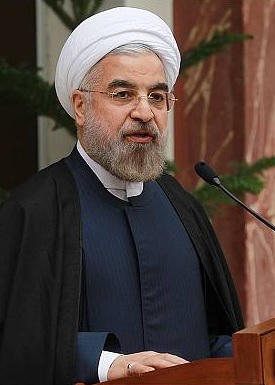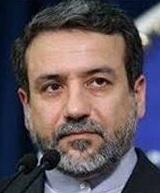On the eve of the one year anniversary of the nuclear deal, President Hassan Rouhani warned that Iran could quickly restore its nuclear program if the world’s major powers violate the agreement. “If the P5+1 wriggles out of its commitments, we are completely ready and capable to reach our desired point in a short time span,” he said during a cabinet meeting. The Joint Comprehensive Plan of Action (JCPOA), which went into its implementation phase in January, rolled back key elements of Tehran’s nuclear program in exchange for sanctions relief.
Other top Iranian leaders have also acknowledged obstacles to implementation, usually blaming the United States for falling short of its commitments. The following are excerpted remarks from the run up to the July 14 anniversary of the nuclear deal.
President Hassan Rouhani
 “If the P5+1 wriggles out of its commitments, we are completely ready and capable to reach our desired point in a short time span.”
“If the P5+1 wriggles out of its commitments, we are completely ready and capable to reach our desired point in a short time span.”
“Joint Comprehensive Plan of Action (JCPOA) is beneficial to all countries and promotes global peace, security, stability and development; violating it will be detrimental to all and anyone who starts this, will be a loser in international stage.”
“The Islamic Republic of Iran proved on this day [July 14, 2015] that it has the political capability to negotiate with the world powers to solve a complicated international issue and defend the Iranian nation’s rights.”
“It is essential that everybody makes efforts according to national interests, rationality and in executing and reinforcing JCPOA, as well as its utilization publically in the region and the world.”
“Tapping JCPOA opportunities needs unity and synergy… We should use this opportunity for the development of the country and youth employment.”
—July 13, 2016, during a cabinet meeting
Foreign Minister Mohammad Javad Zarif
#IranDealOneYearLater pic.twitter.com/2VgKIzpLU6
— Javad Zarif (@JZarif) July 14, 2016
“We all have criticisms of the performance of Americans in [the implementation of] the nuclear deal, and we have explicitly voiced our criticisms.”
“As a deal that resulted from negotiations between different parties, the JCPOA does not include all stances of any of the sides; it rather includes the stances held by all sides.”
“The important point is that the entire world believes the Islamic Republic of Iran maintained its honor in the nuclear talks, and managed to establish its nuclear rights and end the United Nations Security Council resolutions and the cruel anti-Iran sanctions.”
“If the sanctions had continued, Iran’s oil sales would have decreased to zero, and all banking transactions stopped.”
“I don’t think there is even a single unbiased observer who believes what the Islamic Republic of Iran gained from the JCPOA has been unilaterally detrimental for the country.”
He further raised the question whether all international deals and agreements – the legally enforceable ones – are fully observed.
“It is normal [that international agreements are not always fully observed]. Each side of the deal should do its best to make the most use of the situation so as to encourage and force the other sides to do their commitments.”
“This is a balanced view of the nuclear deal.”
“I think the country has had behaved prudently under the guidance of the Leader of the Islamic Revolution. We have made good progress.”
“We cannot change the nature of other countries. Americans have a particular nature, and act based on the very nature.”
“Everyone is saying that the US has not implemented the JCPOA in the best way possible.”
“The European side’s problem is also with the American side. The European sides have mental concerns.”
“Don’t ever forget in what situation the country was. Don’t forget what mental atmosphere had been imposed on the country. It will take time to have the atmosphere eased.”
“The interesting point is that those who created such a mental atmosphere in the world are now critical of those who are trying to ease the situation.”
—July 14, 2016, in an interview with Fars News translated by Iran Front Page
Deputy Foreign Minister Abbas Araghchi
 “One of our important achievements in the Iran Deal was separating the missile issue from the JCPOA. That was a very difficult job.”
“One of our important achievements in the Iran Deal was separating the missile issue from the JCPOA. That was a very difficult job.”
“From the leader's view, any new sanctions against Iran, even if not nuclear-related, will be a violation of the JCPOA.”
“Not every violation leads to canceling the JCPOA, but the violation needs to be a significant violation.”
“Foreign Minister Zarif had a very intense phone conversation with U.N. chief Ban Ki-moon over the United Nation’s position [on the missile issue].”
“Iran will not sacrifice Hezbollah in return for anything.”
“There are some non-JCPOA obstacles that have caused some problems in the JCPOA implementation.”
“The other party has kept its commitments. If they hadn't, we would have followed up on that. These depend on how we look at that.”
“Tomorrow, the ministry of foreign affairs will submit its second report on the JCPOA implementation to parliament, which mentions what cooperation has come about so far.”
“I see the JCPOA beyond sanctions. Due to factional & political reasons, JCPOA and its effects have been limited to sanctions issue.”
“Within six months, we could increase our oil sale level from one million barrels to two million barrels.”
(Translated remarks edited for clarity)
-July 11, 2016, on Iranian television via Abbas Aslani (Tasnim News Agency)
“Living up to some red lines outlined by the Supreme Leader of the Islamic Revolution was not possible, and we honestly informed the Leader of the issue.”
“We cannot say we never crossed the red lines in any of the cases; we did cross them in two or three cases. For example, one of the red lines outlined for the negotiating team was that all sanctions imposed by the U.S. Congress, the U.S. President, the European Union, and the United Nations Security Council should be terminated. When we raised the issue with the American side, they said the sanctions imposed by the President can be removed, but the Congress cannot be convinced to lift the sanctions.”
“Then we said there would be no deal if that is the case. The next order was that the sanctions imposed by the President, the EU, and the UNSC should be removed, and those of the Congress should be stopped.”
“The other side of the deal has implemented its JCPOA commitments on the paper; however, the banking ties and economic collaborations have not been fully realized.”
“The full removal of anti-Iran sanctions will take time. There is a series of procedural problems. The other side’s mischief is part of the issue, which should be discussed case by case.”
—July 17, 2016, during a press conference (remarks translated by Iran Front Page)
Ali Akbar Velayati
“The Americans, as was expected, didn’t respect their commitments, some of [the supreme] leader's 9 conditions [were] not met.”
“The U.S. Senate and Congress have approved bills against us since the implementation of the JCPOA and Obama [the U.S. president] has signed some of them.”
-July 11, 2016, in an interview with state media via Tehran Times and Fereshteh Sadeghi
